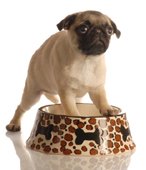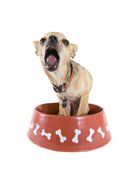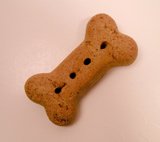 |
 | 
| |
New Puppy CarePuppy Vaccinations are Only the First StepNew puppy care includes an appointment with a veterinarian. Your puppy needs a check-over and puppy vaccinations. Discuss food nutrition, future pet vaccines and when to neuter (or puppy age spayed). As a pet owner, you may have many questions about new puppy care. For example, what's the right time to get puppy vaccinations? What type of food should you give your dog? How do you go about house training? These are all excellent questions and some of the most common for pet owners. Puppy Nutrition and FoodPuppy food comes in a lot of different brands, flavors and price ranges. Vets do not recommend buying cheap, generic food as it usually doesnt have the nutrients your dog needs to grow healthy and strong. Your Vet will probably have several ideas for you for food that's suitable to your puppy. Dogs can eat both meats and vegetables but make sure you discuss with your vet what foods are dangerous to your puppy and what foods need to wait till pup is older. Also make your own dog food and your own homemade dog food recipes for your puppy; it's easier than you think and healthier too. You can also make homemade dog treats or dog biscuits for your puppy. In terms of frequency, once your pup reaches 12 weeks you can feed him or her twice daily. Talk to your vet about serving sizes (which is usually decided by your pup's weight). When you put out food for your puppy, leave it out for about fifteen minutes and then take the bowl away (even if not all eaten). This will help your puppy from becoming overweight, and will ensure that dog food doesn't get stale left out in the open. Pet VaccinesNew puppy care includes puppy vaccinations. Your vet will set you up with a schedule for your dogs immunizations including distemper, leptospirosis, rabies (required for a dog license), lyme disease, and Bordetalla. Your Vet will also likely treat your puppy for worms, which can be very common - particularly in young dogs who get into a lot of 'stuff'. Remember to get the booster shots as required; your vet will provide those details to you. Vaccinations are necessary, particularly if you take your dog on walks, and/or outside of your place, where they can be exposed to diseases or creatures (like ticks) that can cause life-threatening illnesses. Puppy - age spayedDogs can become fertile around 6 months old, so youll want to spay or neuter the pup between 8 weeks and 6 months. Note that some breeders recommend waiting longer for larger dogs who are doing a lot of growing in that first year; discuss the best age for your pup with your veterinarian. In addition to controlling the population of stray and/or unwanted dogs, a side benefit of spaying or neutering a dog is that the procedure is known to have a calming effect on their temperament. House Training a PuppyNearly all dog trainers strongly advocate crate training because dogs do not like to soil the space in which they sleep. It takes a little time and practice, but if you work with your puppy daily, using the crate for when you cannot watch him or her and as a private 'room' that they can retreat to as they wish, crate training is very painless for both the dog, and human companions. For successful puppy "potty training" you need to reward your puppy properly throughout the training process. Never punish your pup if you did not see them make a mistake, and never use the crate as punishment or this method will not work. Remember your new puppy is a baby and theyre not going to learn to be well-trained pets overnight. Pay attention to your canine's body. Most dogs need to go out after a nap, after drinking water, and if they get very excited. If you see the dog circling - get moving! Also try to keep your pup on a consistent feeding schedule thats consistent for best results. New Puppy Care: SocializationNew puppy care also includes socializing your dog to every member of your family including other pets. Humans arent difficult to introduce, but older animals in your house may prove a little less than friendly. They will naturally try to establish a pecking order (and unless the dog is at risk of harm, you HAVE to let this happen). Dogs are pack creatures, and this animal is now part of your pack. It's also important to let your puppy socialize with other dogs outside of the home; they need to learn social skills (it's like doggy pre-school). During socialization, its important to maintain your authority and be consistent with your commands, responses, etc. You are 'top dog' here and even when youre showing your dog affection, your place in his or her life must be firmly established. New Puppy Care: Challenging and Worth it!Getting a new pup is a great deal of fun, but it's also a lot of work. Be prepared to invest time and energy in your pet. If your life doesnt allow that, you may want to consider an animal that isnt quite so needy. However this investment of time and energy is paid back many times over in the love and affection your puppy will have for you. Remember to give your pet adequate food, water, access to a vet, good training and attention, and lots of love! And also remember to take care of your new puppy's paws, particularly if you are walking her or him on cement or rough surfaces. We recommend a product called PawPaw for conditioning, and healing, your pup's paw pads. PawPaw will nourish the paws and pads and provide a protective layer. This is especially important for young puppies and older dogs (with dryer paws). Paws can become dry and cracked and get easily infected. Return to top of New Puppy Care. Return to The Dog Biscuit Home Page. |       Related Articles
Each of these articles provides you with puppy information.
New Puppy Care Pet vaccines, neutering/spaying, check-ups, and more. How to Train a Puppy? Puppy training 101. House Training a Puppy Successfully training your new puppy - it's possible! Housebreaking a Puppy Your puppy needs to learn; housebreaking. Puppy Teeth: Dental Care Chewing and biting are normal symptoms of teething. Puppy Weight Estimates Are you able to estimate the potential weight of your pup at full growth? Puppy Worms: Treat Early Your pup's health is important; be aware of sick puppy symptoms and causes. | ||
|
Enjoy This Site?
Then why not use the button below, to add us to your favorite bookmarking service? | |||
|
| Home | About
| Contact | Sitemap
| What's New
|Privacy Policy |
This site is for informational purposes only. If you have an issue with your dog's health, please see your vet.
Website design by Webmidwife.com | |||
| | |||







